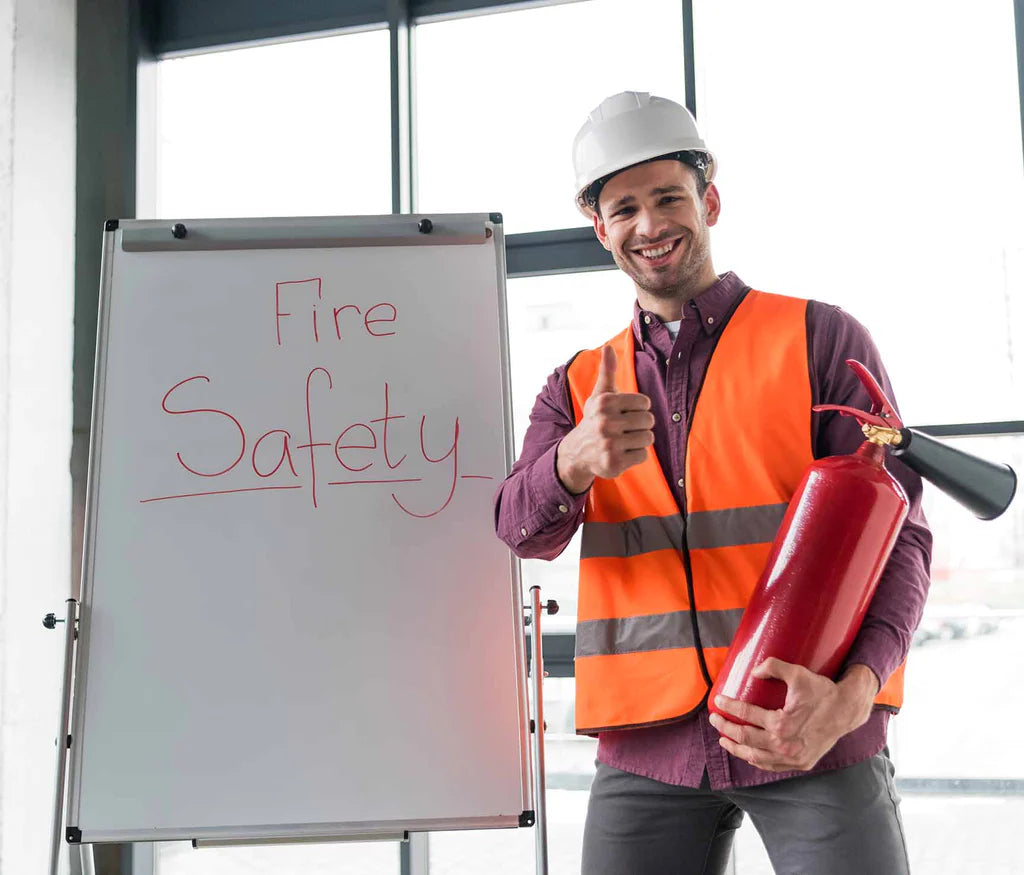
There is a plethora of good advice out there on how we can take critical fire safety measures in our homes. Don’t be caught with heavy losses by paying attention to these essential steps for keeping your home safe from fires.
Let’s look at why it's necessary, where you can find expert advice and an easy summary of steps you can work off straight away. We also have a shopping checklist for your next visit to the hardware store.
Why You Need a Fire Safety Checklist in Your Home

Did you know that most of the fatalities arising from fires in Ireland take place in the home and involve the elderly?
As more and more of our activity takes place in the home in this post-pandemic world, there is a case for making sure that we keep this increasingly important hub for work, entertainment and schooling a safe place all year round.
If you are just moving into a new home this is also a good checklist to pay attention to as you set it up for safety from day one.
There are also new devices and products on the market that you can install in your home to take away the worry and mitigate against excess damage during a small fire.
Excellent Resources Home Fire Safety Advice
There 3 main ways to ensure you do the right thing
- Prevention
- Detection
- Evacuation
There are some good authoritative sources of excellent home safety advice in general.
- The Red Cross does have a great blog on staying safe anyway and in this instance do check out their advice: 15 Ways to Avoid Fire in your Home
- We also checked out the Dublin Fire Brigades' excellent source of expert and experienced knowledge in their page on Fire Safety at Home Advice
- The Irish Government also has a good guide on Fire Safety in your Home
- The HSE also has an excellent guide on how to: Be prepared if there's a fire in your home
1. Home Fire Safety Prevention Tips

There are some basic habits and routines that could mean never having to deal with a fire in the first place
Don’t Keep these Bad Habits
- Don’t use flammable liquids indoors
- Don’t smoke near flammable liquids
- Look for obvious fire risks regularly as a matter of habit - like overloaded sockets, unattended candles and unattended appliances such as an iron left running or overheating
- Take extra care when using heating sources and cooking burners
- Don’t smoke in bed or when drowsy or medicated or smoke in the home at all if you can help it. If there is a smoker in your home be sure to have purpose-built deep, sturdy ashtrays that can contain any flare-up. To be extra careful, you should douse cigarette and cigar butts with water before disposal.
Safety Measures To Keep as Home Habits
- Always secure matches and lighters safely in a high place away from children in a secure spot if you have little ones
- Sleep with your door closed to prevent smoke
Fire Safety Devices you can Install
- Install fire extinguishers in your residence and teach family members how to use them. Different types of fire extinguishers may be suited to different parts of your home
- When in a Kitchen environment or near a BBQ where there may be oil, have a fire blanket on standby as well
- Here are some options:
- SafetyWorx Multi-Purpose 1KG Fire Extinguisher - this includes a dry powder 1kg multi-purpose fire extinguisher with a wall mount. It is suitable for most types of fires including electrical fires and has a 5-year warranty
- Fire Blanket 1M x 1M - This is recommended for use on pan fires and clothing fires - it is made from strong non-flammable woven glass fibre and is also wall-mountable with quick release straps
- SafetyWorx 2 in 1 Home Fire Safety Kit - containing a Fire Extinguisher & Fire Blanket. This includes a Dry powder 1kg multi-purpose fire extinguisher with wall mount and 1m x 1m wall-mountable fire blanket
- You can also install an automatic fire sprinkler system in your residence
Bring in A Safety Expert
These are the people that you should be considering for friendly home advice. It’s their job so do avail of these options, especially when renovating your home or moving into a new one.
- Be mindful of your electrical wiring and keep it dry and away from water in case of a short circuit - have your wiring checked and installed by a proper certified electrician
- Ask your local fire department to inspect your residence for fire safety and prevention
- Get your gas boiler checked every year as well by the Bord Gais technicians - this is a free service
2. Home Fire Detection Tips

Smoke Detectors and Fire alarms
A reliable fire or smoke alarm that works in good time will time get everyone out of the house before it's too late and even buy you enough time to address a small fire before it is uncontrollable.
- Be sure to install smoke alarms on every level of your residence and maintain them regularly
- Test your smoke alarms weekly or ask someone to do it. Check the batteries
It’s also critical that once you detect a fire that is too rampant to control on your own - you need to Call 999 or 112 and ask for the fire service to come out.
3. Home Fire Emergency Evacuation Tips
Secure Your Evacuation Route in Advance
- Make sure you have allowed for escape routes from everyone’s rooms.
- Review the routes with your family by practicing your escape from each room
- You should consider escape ladders at the back or the side of the house if your residence has more than one level and no secondary staircase
- Give yourself at least a metres width in every corridor or pathway and make sure there aren’t any major obstacles through back doors etc.
- Make sure everyone knows where the keys are kept or hung in case the door is locked and you may be fumbling around looking for it unnecessarily - so have a permanent set of spare keys nearby the door if needed, in a secure location
What To Do During a Fire
Here are important points to remember if you are caught during a fire, have caught fire yourself or need to get away fast
- Stop, drop, and roll: remember this if your clothes catch on fire - the key thing to remember is to starve the fire of oxygen until the fire is extinguished. Running makes the fire burn faster
- When you are escaping from a fire check the closed doors for heat before you open them as there may be a blast waiting on the other side. If you suspect it's too hot, do escape through another opening like a window
- If you do open a door to another room - do it slowly to ensure the fire is not going to suddenly emerge and watch out for smoke blocking your escape route
- When moving through a smoke-filled room with a fire in it - crawl under the canopy of smoke towards your exit - Physics dictate that heavy smoke and poisonous gasses always collect first along the ceiling giving you less-toxic air to breathe nearer the ground
- Where possible close all doors behind you as you escape to delay the spread of the fire


